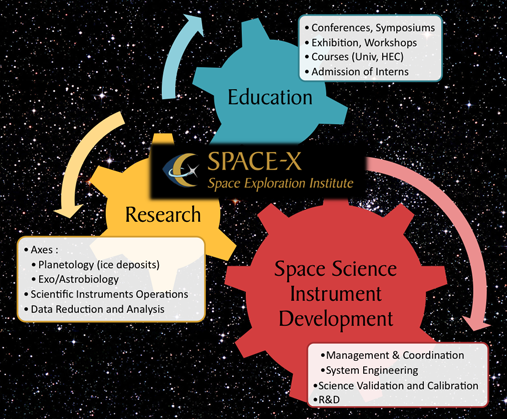The Space Exploration Institute, SPACE-X for short, is a non-profit research institute located in Neuchâtel. Expertise of the staff covers several fields of science and engineering, including planetary science, astronomy, geology and system engineering for space science instrument development.
Space Exploration Institute Goals :
To Develop the Space Exploration Activity, in particular to develop the research link to the planetary exploration by:
- Perform research on the Moon, Mars, Europa, … Asteroids… included studies on the ices deposits and past or present life traces (Exo/Astrobiology)
- Contribution/Elaboration of science proposals in order to participate to the future missions which explore the solar system
- Develop the Science Instruments link to this research
- Operate the on-board instruments, process, analyse the science data output
- Promote science to the public, at schools , colleges, universities over Neuchatel, Switzerland and around the Earth.

Currently, SPACE-X is engaged in the ExoMars Rover project of ESA and is supported by the Swiss Space Office (SSO): Dr. Jean-Luc Josset, Director of SPACE-X is PI (Principal Investigator) of CLUPI (CLose-UP Imager) and Co-PI of PanCam. The mission is scheduled to be launched in 2028. CLUPI will return the first images of a sample extracted 2m under the surface of Mars.
Background experience of staff at SPACE-X runs back many years before the constitution of the Institute. Personnel at SPACE-X have made significant contributions to missions like ExoMars (since 2003) and SwissCube, Rosetta, Beagle-2, Proba-2, Smart-1 (AMIE), Proba-1, ISS, MERIS, PHOBOS, SOHO, and been involved in a few others with lesser contributions.
We strive to find new lines of development in order to increase the efficiency and operational scope of our instruments and thus furnish to the missions we are involved in extensive quality imaging for scientific purposes.
